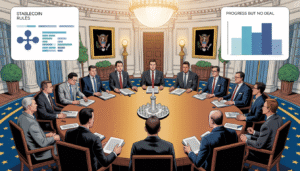The United Arab Emirates has taken a big step in global crypto regulation. On September 23, 2025, the Ministry of Finance announced that the UAE signed the Multilateral Competent Authority Agreement under the Crypto Asset Reporting Framework (CARF). Starting in 2027, the country will collect and share tax data on crypto transactions. The first exchanges of information with international partners will begin in 2028.
This decision shows that the UAE is aligning with international standards on tax transparency. It also reflects a growing recognition that digital assets need the same level of oversight as traditional finance.
What is CARF?
The Crypto Asset Reporting Framework, or CARF, was created by the Organisation for Economic Co-operation and Development (OECD). Its goal is to stop tax evasion and create uniform reporting rules for digital assets.
Under CARF, crypto exchanges, wallet providers, and other intermediaries must collect detailed information about user transactions. They must then report this information to tax authorities. The data is shared automatically with other countries that are part of the agreement.
By joining CARF, the UAE has agreed to adopt these standards into its national laws. The Ministry of Finance has already launched an eight-week consultation with industry players. The consultation runs until November 8, 2025, and will help shape how the rules are applied locally.
Why the UAE’s Decision Matters
Greater Clarity for Investors and Businesses
For years, many investors asked whether the UAE would remain a crypto haven. The country offered tax-free trading and friendly rules. That environment drew global exchanges and startups. However, some institutions hesitated because of the lack of clear international standards.
The decision to adopt CARF changes that. It gives businesses and investors a clearer picture of compliance obligations. As a result, more serious players are likely to enter the UAE market.
Alignment with Global Standards
The UAE is known for its pro-business approach. But in recent years, the global community has pressured all financial centers to improve tax transparency. By adopting CARF, the UAE signals that it wants to cooperate, not compete, with global regulators.
This alignment could also improve the UAE’s image. Instead of being seen as a tax haven, the country can market itself as a reliable and modern financial hub.
Impact on Domestic Rules
The UAE still does not tax most individual income, including crypto gains. But CARF means more reporting obligations for exchanges and wallet providers. These firms will need to upgrade their systems to collect user data and share it with authorities.
While this does not mean crypto trading will be taxed immediately, the move shows that the government is preparing for a more regulated future.
Challenges Ahead
Technical Complexity
Tracking crypto transactions is difficult. Assets move across wallets, blockchains, and borders. Exchanges will need strong systems to capture and verify this data. They must also reconcile activity across different types of products, such as spot trading, derivatives, and staking.
Privacy Concerns
Users may worry about who will see their data and how it will be protected. Automatic data sharing could raise questions about privacy, especially in cross-border cases. Regulators will need to balance transparency with security.
Cost for Businesses
Large exchanges can afford compliance upgrades. Smaller startups may struggle with the cost of building new reporting systems. This could push some firms out of the market or force them to merge with larger players.
Uneven Global Adoption
Not all countries are adopting CARF at the same pace. If some partners lag behind, there could be gaps in reporting and enforcement. This could create an uneven playing field for businesses operating internationally.
What Should Crypto Investors and Firms Do Now?
For Businesses
Prepare for compliance. Exchanges and wallet providers must assess their current systems and start planning for upgrades.
Join the consultation. Businesses should share feedback with the Ministry of Finance before November 8.
Budget for costs. Compliance will bring extra expenses. Firms should plan early to avoid shocks later.
Train staff. Employees must understand new reporting rules and how to handle user data securely.
For Investors
Understand reporting obligations. Even if crypto gains remain untaxed, users should expect more oversight.
Keep records. Maintain a clear log of transactions, wallets, and exchange accounts. This will help if authorities request information.
Choose exchanges carefully. Use platforms that show readiness for compliance. Proof of reserves, audits, and clear policies are positive signs.
Stay informed. Follow updates from the Ministry of Finance and trusted industry sources.
The Bigger Picture
This decision is not happening in isolation. The UAE has already built strong institutions for digital assets, such as the Virtual Assets Regulatory Authority (VARA) in Dubai and the ADGM framework in Abu Dhabi. These regulators provide clear rules for exchanges, custody, and tokenization projects.
Now, by joining CARF, the UAE is reinforcing its reputation as a serious and reliable hub. Other regions such as the European Union are rolling out MiCA rules, while Singapore and Hong Kong are tightening oversight. The UAE’s move ensures it stays competitive while protecting its financial system from abuse.
The UAE’s commitment to automatic crypto-asset tax reporting is a turning point. It shows that the country wants to remain a leader in digital finance while cooperating with global partners.
The changes will not be easy. Businesses will face higher compliance costs, and users will see more oversight. Yet the long-term benefit is clear. Legal clarity will attract larger institutions, protect investors, and strengthen the UAE’s standing as a financial hub.
For now, both firms and investors must prepare. The countdown to 2027 has begun, and those who adapt early will be best positioned to thrive in the new environment.




